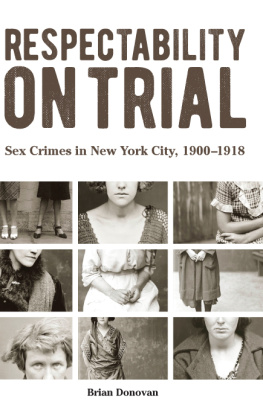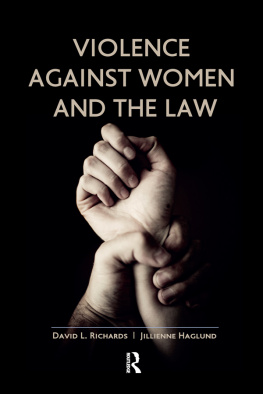Brian Donovan - Respectability on Trial: Sex Crimes in New York City, 1900-1918
Here you can read online Brian Donovan - Respectability on Trial: Sex Crimes in New York City, 1900-1918 full text of the book (entire story) in english for free. Download pdf and epub, get meaning, cover and reviews about this ebook. year: 2016, publisher: SUNY Press, genre: Home and family. Description of the work, (preface) as well as reviews are available. Best literature library LitArk.com created for fans of good reading and offers a wide selection of genres:
Romance novel
Science fiction
Adventure
Detective
Science
History
Home and family
Prose
Art
Politics
Computer
Non-fiction
Religion
Business
Children
Humor
Choose a favorite category and find really read worthwhile books. Enjoy immersion in the world of imagination, feel the emotions of the characters or learn something new for yourself, make an fascinating discovery.
- Book:Respectability on Trial: Sex Crimes in New York City, 1900-1918
- Author:
- Publisher:SUNY Press
- Genre:
- Year:2016
- Rating:5 / 5
- Favourites:Add to favourites
- Your mark:
- 100
- 1
- 2
- 3
- 4
- 5
Respectability on Trial: Sex Crimes in New York City, 1900-1918: summary, description and annotation
We offer to read an annotation, description, summary or preface (depends on what the author of the book "Respectability on Trial: Sex Crimes in New York City, 1900-1918" wrote himself). If you haven't found the necessary information about the book — write in the comments, we will try to find it.
Brian Donovan: author's other books
Who wrote Respectability on Trial: Sex Crimes in New York City, 1900-1918? Find out the surname, the name of the author of the book and a list of all author's works by series.
Respectability on Trial: Sex Crimes in New York City, 1900-1918 — read online for free the complete book (whole text) full work
Below is the text of the book, divided by pages. System saving the place of the last page read, allows you to conveniently read the book "Respectability on Trial: Sex Crimes in New York City, 1900-1918" online for free, without having to search again every time where you left off. Put a bookmark, and you can go to the page where you finished reading at any time.
Font size:
Interval:
Bookmark:

RESPECTABILITY
ON TRIAL
RESPECTABILITY
ON TRIAL
Sex Crimes in New York City, 19001918
Brian Donovan

For Natalie

Published by State University of New York Press, Albany
2016 State University of New York
All rights reserved
Printed in the United States of America
No part of this book may be used or reproduced in any manner whatsoever without written permission. No part of this book may be stored in a retrieval system or transmitted in any form or by any means including electronic, electrostatic, magnetic tape, mechanical, photocopying, recording, or otherwise without the prior permission in writing of the publisher.
For information, contact State University of New York Press, Albany, NY
www.sunypress.edu
Production, Ryan Morris
Marketing, Fran Keneston
Library of Congress Cataloging-in-Publication Data
Names: Donovan, Brian, 1971 author.
Title: Respectability on trial : sex crimes in New York City, 19001918 / Brian Donovan.
Description: Albany : State University of New York Press, 2016. | Includes bibliographical references and index.
Identifiers: LCCN 2016000438 (print) | LCCN 2016012982 (ebook) | ISBN 9781438461953 (hbk. : alk. paper) | ISBN 9781438461960 (e-book)
Subjects: LCSH: Sex crimesNew York (State)New YorkHistory20th century.
Classification: LCC HQ72.U5 D66 2016 (print) | LCC HQ72.U5 (ebook) | DDC 364.15/3dc23
LC record available at http://lccn.loc.gov/2016000438
10 9 8 7 6 5 4 3 2 1
Contents
Acknowledgments
I am grateful to Ellen Belcher from the Lloyd Sealy Library at the John Jay College of Criminal Justice for helping me acquire material from the Trial Transcript Collection. This book would have been impossible to write without her help. I need to thank several colleagues for their helpful comments and encouragement, including Sherrie Tucker, Michael Baskett, Cathy Preston, Akiko Takeyama, and Marta Vicente. Lynn Davidman delivered critical feedback on the manuscript as well as timely support. William Staples and Joane Nagel gave me a needed kick in the pants to finish the project.
The Hall Center for the Humanities at the University of Kansas provided a wonderful space for me to present and discuss my research. I am especially thankful for Victor Bailey, Kathy Porsch, Ann Schofield, and Kim Warren. Others gave me generous help at different stages of the project. Tori Barnes-Brus proved to be an excellent collaborator, and her research help on and her assistant Rafael Chaiken for their efforts in bringing this project into existence. This book is dedicated to Natalie Donovan, my wife and best friend of fifteen years, for her unwavering love and companionship. I could not have done this without her.

A previous version of chapter 2 appeared as Gender Inequality and Criminal Seduction: Prosecuting Sexual Coercion in the Early Twentieth Century, Law and Social Inquiry 30 (2005): 6188. A previous version of chapter 4 appeared, coauthored with Tori Barnes-Brus, as Narratives of Sexual Consent and Sexual Coercion: Forced Prostitution Trials in Progressive-Era New York City, Law and Social Inquiry 36, no. 3 (2011): 597619. Both are used with permission of John Wiley & Sons.
Introduction
In January 1906, a young woman named Margaret Peters testified in the New York City Court of General Sessions that a man named Julius Bloch raped her in the cigar factory where they both worked. Peters and Bloch were alone in the factory when the attack occurred. Bloch allegedly pushed Margaret Peters onto a wooden box and forced himself on her. Peters testified that the assault was so traumatic that she lost her mind and was rendered temporarily unconscious (an account that the defense attorney used against her later in the trial). She returned home, told her family what had transpired, and was escorted to a police station where a charge of first degree rape was filed against Julius Bloch.
In the trial, Julius Blochs defense attorney attacked Margaret Peterss sexual respectability. He insinuated that Margaret Peters told smutty stories at work. Although the judge snapped at the attorney for improperly discussing the girls unchastity, other witnesses testified that she was disreputable and, therefore, fabricating her account of sexual assault. The jury deliberated for thirty minutes before acquitting Bloch for the crime of first degree rape.
The trial of Julius Bloch encapsulates the tensions and contradictions in early twentieth-century notions of sexual respectability. New York women like Margaret Peters were increasingly working outside of the home, exploring romance on their own terms, and engaging in frank sexual talk that was once deemed the exclusive domain of men. By the 1920s, the New Woman and the flapperimages of a confident and assertive womanhoodwould become staples of popular culture and accepted by wide swaths of American society. In the years leading up to World War I, however, the criterions of respectable womanhood were in flux, and women were often held to standards of behavior we associate with the stereotypes of Victorianism: women were expected to be chaste, modest, and pure. Their sexuality was supposedly signified by their lack of sexual passion and their focus on the hearth and home.
As a theater of respectability, the criminal courtroom throws into bold relief the contested nature of gender and sexuality in early urban America. In People v. Bloch , the trial participants engaged in various performances of proper manhood and womanhood. The defense attorney and several witnesses claimed that Margaret Peters was sexually assertive and inappropriate. Frida Gail did not want to tarnish her reputation by uttering the supposedly vulgar comments made by her coworker. Julius and Jennifer Bloch testified that Julius met hegemonic standards of masculinity with his paycheck and attention to home life. The fact that he had developed an attraction to, and possibly raped, his coworker did not damage his respectability in the eyes of the all-male jury, but his alleged victim was consider dishonorable and unwomanly because she engaged in bawdy workplace banter.
This book examines sex crime trials in New York City that occurred during the so-called first sexual revolution (approximately 19001920). The opening decades of the twentieth century were a volatile period in US sexual history. New forms of leisure, romance, and marriage challenged sexual Victorianism, especially in major cities like Chicago, Los Angeles, and New York City. Although flapperssexually assertive young women from the Jazz Agesymbolize, to some extent, the first sexual revolution, they actually embody its end stages. Elizabeth Clement notes, By the late 1890s, conditions were ripe for revolution in working-class understandings of the appropriate sexual behavior of women.
On the other hand, men and women had differential access to new work and leisure opportunities, and they experienced the so-called revolution unevenly. Young women encountered a heightened risk of acquaintance rape as they pursued sex, love, and romance in an era of unsupervised dating. Young women who took advantage of new social and sexual opportunities also faced state surveillance and social control. For instance, women were arrested for chastity offenses for flirting with servicemen near military bases. Also, new employment prospects put women at risk for exploitation, and shady employment agencies sometimes drew unsuspecting women into sex work. Women, who may have entered sex work on their own volition, encountered abuse by both pimps and customers.
Font size:
Interval:
Bookmark:
Similar books «Respectability on Trial: Sex Crimes in New York City, 1900-1918»
Look at similar books to Respectability on Trial: Sex Crimes in New York City, 1900-1918. We have selected literature similar in name and meaning in the hope of providing readers with more options to find new, interesting, not yet read works.
Discussion, reviews of the book Respectability on Trial: Sex Crimes in New York City, 1900-1918 and just readers' own opinions. Leave your comments, write what you think about the work, its meaning or the main characters. Specify what exactly you liked and what you didn't like, and why you think so.











